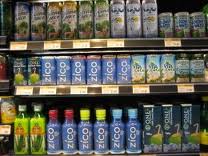Concerned about the speed with which coconut water companies have extended their supply lines to meet skyrocketing demand, vendors working with Whole Foods are being asked to supply audited certification that confirms they have ethical and responsible sourcing.
In a note sent to coconut water makers on Dec. 31, Whole Foods’ global grocery coordinator, Errol Schweizer, informed the company’s coconut water vendors of their need to be certified by agencies that have been pre-qualified by the retailer to conduct social responsibility audits.
“We are sending a heads up to our coconut water suppliers to make sure that their supply chains are free of forced labor, child trafficking, discrimination and other unacceptable practices,” Schweizer wrote. “We are also asking suppliers to be proactive in pursuing higher level ethical sourcing and sustainability certifications as well.”

As coconut water has grown, Whole Foods has been one of the most important retailers for the category. It is still the chief retailer for many brands, and failure to meet the company’s requests could be a huge blow to a growing beverage company.
Because coconut water already has strong roots in the natural products industry, many brands are already familiar with ethical sourcing models, either as a result of the demands of their retailers or because of their own social and ethical priorities. But at the same time, the footprint for coconut sourcing has grown with the category, which generated hundreds of millions of dollars at the retail level last year. What started as a product largely sourced in Brazil has migrated to Indonesia, the Philippines, Thailand, and Vietnam, among other countries.
“As the coconut water category has grown, so has the reach of our brand’s supply chains,” Schweizer told suppliers. “Unfortunately, we have seen very few brands actively market and promote their commitment to ethical sourcing and sustainability in this category. We do prioritize the few folks who have taken such heroic steps, but are now wanting to know what everyone else is doing.”
Schweizer did not cite any specific human rights or environmental abuses. Whole Foods has been proactively trying to advance social and ethical standards for its suppliers in recent years, most particularly in the area of cocoa, where it is trying to set minimum standards for chocolate products or those that use cocoa as an ingredient.
The standards are evolving to involve a “seed to shelf” look at supplier practices. In one notable situation, Whole Foods announced last year that it was removing Hershey-owned Scharffen Berger chocolate from its stores due to concerns about that product’s sourcing and child labor practices.